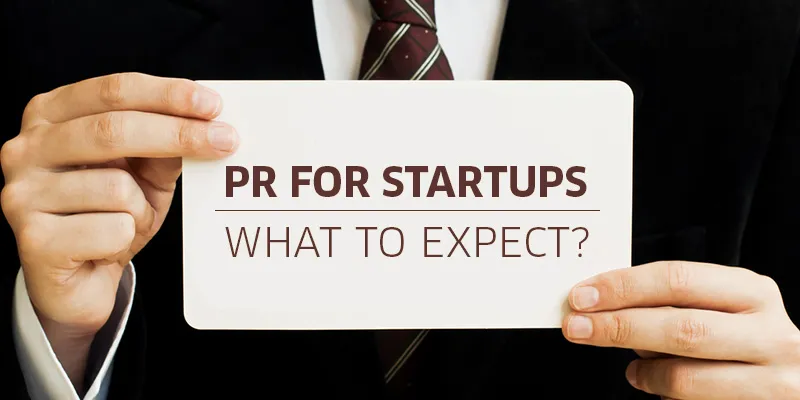Public Relations for dummies: What startups need to know while on-boarding PR?
“In an age where organisational and business cycles have shrunk to 1/10th of what they used to be, a PR’s challenge today is to keep pace with the business, they're on-boarding.” says a confident N Ravi Shankar, Chief Executive Officer (CEO), Aim High, while sitting with his co-founder and COO, G Gopinath.
Started in 2007, their organisation, Aim High, claims today that it is a holistic communication consulting firm. It advises clients like 3M India, Flipkart, Ola Cabs, and Helion Advisors, to name a few.
In a conversation with YourStory, the duo explains what startups should expect and keep in mind while considering on-boarding Public Relations (PR).

Warming up to the concept of PR
Ravi tells us that startups are still warming up to the concept of PR; the new breed of individuals is smart at judging the value proposition when it is explained to them. However, he adds, PR should primarily be seen as a business function, not as a marketing function.
Adding some perspective, Gopinath believes that the ecosystem has warmed up. Moreover, when startups first approach PR agencies, they know what they want out of them, but what they want to know is ‘how’.
The why
When asked why a startup should hire PR, the duo retorts, “Would you rather use a service that you happened to chance upon, or a service that you read about in the papers?”
They further list the following:
- It is a third-party (media) endorsement, at the minimum providing visibility and allowing the company to reach out to partners, investors, current and potential employees, potential investors and users.
- It is a cost-effective way of reaching out to target audiences.
They suggest that a startup is better off investing marketing budgets in ‘paid media’ only when they have enough fuel (funds) in the tank.
Related Read: When do startups really need PR agencies?
The how
So, how do startups leverage the power of PR? The duo smiles and tells us that the key lies in hiring the right agency and having realistic expectations.
It is essential to liaison with an agency who understands your business well enough. This is an essential requisite for a PR to narrate your story. Further:
- Look for a business consultant in your PR consultant
- It’s good to partner with another startup, since it might be able to understand the nature of your business better than anyone.
- Hire an agency like you’d hire someone for internal staff; make sure they are ready to grow and adapt to the dynamicity of your business
The expectations
Gopinath explains that startups should think of PR as a long-term practice, keeping prudent results in mind. According to him, image building is not a quick process; it takes time for a brand to build trust in the market.
Recalling some of his experiences, Ravi says that PR cannot work magic for a startup’s sales function. It should rather be regarded as a method of softening and educating target audiences (end customers, venture capitalists, potential talent)
Possible challenges
At the PR’s end, the challenge is to keep pace with the business, and change the image of the company with its growth, to help it transition out of being considered an early stage company.
Secondly, the ability to comprehend and tell a startup’s story, while trying to differentiate them to prevent their sinking into the quagmire of startups, could be another challenge.
At the startup’s end, challenges move more towards finding the right partners who will understand their businesses.
For a startup, there are multiple ways to use or invest the money they have. They can use it on activities which are more direct and customer-acquisition driven than PR. Thus, getting startups to work with PR is a bigger challenge than the same is with an established business.
How much should one invest in PR?
The two suggest spending money on a Return on Investment (ROI) basis.
According to them, PR remains the most cost-effective way to reach out to your target audience. They say this because most other mediums are paid forms of media. Thus, on getting a PR boarded, one has to pay for their costs only, and not for any third-party testimonials the startup receives.

Parameters of a good PR
Gopinath tells us that it all lies in the key message. If looked at from the right perspective, entrepreneurs should think, ‘I have certain key messages for my PR team. If delivered, they will make a good PR piece.’
So what should a startup see while proposing a story? In reply to this, Ravi tells us that one needs to question whether the proposition is new and significant, and whether there is a natural by-product emerging from the business, that lends itself to PR; like social impact that can make news.
Are you ready for PR yet?
Ravi tells us that a startup should hire a PR when they have a story to tell, and a budget to match. Moreover, they should wait till the founders, as an enterprise, think they’re clear about their value proposition to the market. Also, one should not hire a PR in a scenario where their value proposition will be unrecognisable after 6 months.
Further, Gopinath cautions us on how startups tend to experiment. He says that PR is not an experiment, because its product is tangible and can be seen. A startup should on-board a PR consultant only when they’re absolutely sure that they require it.
(First image credit: Shutterstock)



